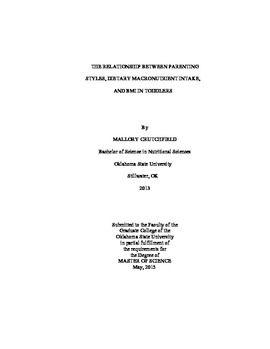| dc.description.abstract | The purpose of this study is to determine the relationship between parenting style, dietary macronutrient intake, and growth in toddlers, aged 2.5- to 4-years-old. This study is a continuation of a prior longitudinal study examining the relationship of maternal micronutrients/toxicants and infant cognitive development during infancy. Forty-seven mother-toddler pairs returned to be re-evaluated. At the returning visit, mothers filled out a demographic and parenting style dimension questionnaire, anthropometric measurements were taken, and a 24-hour recall of the toddler's diet was completed. Toddler anthropometrics were taken at the returning visits. Two additional 24-hour recalls of the toddler's diet were completed over the telephone with a primary caregiver. Descriptive statistics showed mothers were predominately white, well-educated, and married. Additionally, the majority of children were of normal weight and mothers had a mean BMI of 25.36. Toddler diet revealed children consumed slightly over recommendations with a mean caloric intake of 1559 calories per day.A significant positive correlation was found between permissive parenting style scores and toddler fat, carbohydrate, and total calorie intake. A negative correlation was found between permissive parenting style score and protein calorie intake percentage. Additionally, it was found that permissive parenting style score, not maternal BMI, is a predictor of toddler BMI, when using total calories as an outcome variable in a linear regression model. No correlation was found between any category of parenting style and toddler growth or between toddler BMI groups and maternal demographic variables. In conclusion, though the sample consisted of toddlers from mothers who were well educated, middle to high income status, and married; a correlation was seen among permissive parenting style subscales scores with toddler dietary intake and a predictor of toddler BMI. Further research is called for using a larger sample size and following children for a longer period of time to examine whether the relationship between parenting style and later growth emerges. | |
